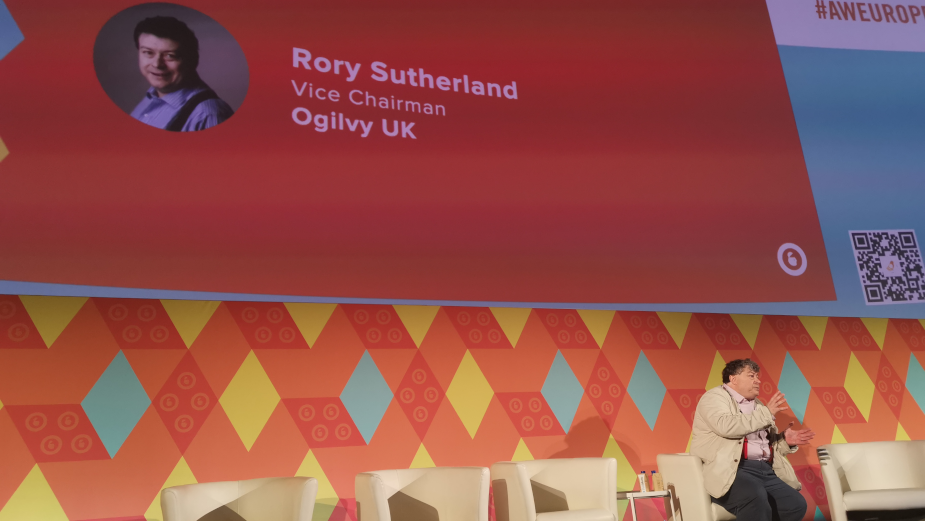
Rory Sutherland: ‘We've Managed to Do Something that Accountants and Business Consultants Can Never Do’

After a few years of going to conferences like Advertising Week Europe, you work out that certain speakers are always good value to sit and listen to, no matter the proposed subject matter. Rory Sutherland is one of those.
So at AWEurope 2022, the vice chairman of Ogilvy UK’s talk ‘I’m Sorry, But We Really Should Have Warned You’ was half an hour well spent. During it, he reflected on how that a lack of psychological understanding harms the marketing industry. In his distinctive style, linking together anecdotes, business case studies and research from the fields of psychology and economics, Rory connected a series of intriguing thoughts that challenged the data metric-reliant audience of marketing professionals in London’s Picturehouse Central cinema.
Rory is a staunch defender of creativity’s power to add value in seemingly magical ways. “Every now and then, just bit by bit, we've managed to do something that accountants and business consultants can never do,” he said. “And when that happens, we should celebrate it much more than we do. But tragically in the modern age, it's getting more and more difficult to do.”
As an example of that magic, Rory noted that he’d like to celebrate an achievement that will likely not get a mention on the Croisette in Cannes – the idea to put glass panels in the roofs of London’s cabs. The “emotional added value,” of that act, he pointed out, is something increasingly hard to achieve.
“Doing anything which adds emotional, intangible value in a way that isn't directly measurable or translatable into immediate revenue is now a very difficult uphill struggle in any kind of business,” he said.
To demonstrate, he reeled off a series of examples of creative thinking reframing negatives as positives. He pointed out that some of most effective and enduring advertising has taken a negative (like a slow journey) and turned it into a positive. Look at Stella Artois’ ‘Reassuringly Expensive’, Guinness’ ‘Good Things Come to Those who Wait’ or Avis’ claim that being number two in rental cars means they try harder. So, He why has nobody tried to make trains more like cruise ships, where speed is irrelevant because the journey is enjoyable? The focus in the world of trains is on efficient transportation rather than a holistic appreciation of experience design
Applying this thinking to another transportation problem, where’s the ‘Good Things Come to Those who Wait’ for electric car charging? Battery life seems to be given more airtime than it deserves, noted Rory, particularly in the UK, where range anxiety needn’t be as big a concern as it is for several reasons, from weather to the kind of power plugs the country uses.
“The joy of alchemy in creating psychological value is, if we can just understand people better, we can be inordinately more efficient at creating value and solving problems without the necessity for burning huge amounts of resources or consuming more raw materials, because value created in the head is generally pretty green compared to value created in the factory.” So create it in the mind of the consumer, argued Rory..
According to Rory, much decision making in the business world is based on the following inaccurate assumption: “You already know what people want, they can define to you what it is they want. You can define that desire in numerical terms (like speed or journey time) and therefore the only competition in business consists of delivering those desired goods at a lower price than your competitors, or in greater quantity.”
The truth is people can’t fully tell us what they want, he argued. And as a result, business needs to get better at understanding people.
There are many things that make business sense but don’t make sense when it comes to real human behaviour. In the telecomms sector, Rory identified one such example: ‘quad play’, or combining broadband Internet access, television and telephone with wireless service provisions. To someone who’s just come out of Harvard Business School, those services are all delivering stuff down wires to people’s lives. But that’s not how people think about those services. “Would you go to a BT theme park? Probably not. On the other hand, would I trust Disney to provide my broadband? I’m not quite sure I want a Disney engineer coming round to my house.”
The glut of metrics in today’s world has led to a “business where it’s impossible to create value except to the extent that you can measure it,” said Rory.
Psychology-first thinking as opposed to shareholder-first thinking is much more interesting and adds more value, he said. “Quantification starts as a toy, then becomes a tool, then it becomes a trap.” With an increasing focus on the targeting of digital advertising, chasing incremental value gains, rather than its creative execution, marketers are squandering their potential to learn from metrics. “You're not actually testing what's important. You're testing what's easy to test.”













